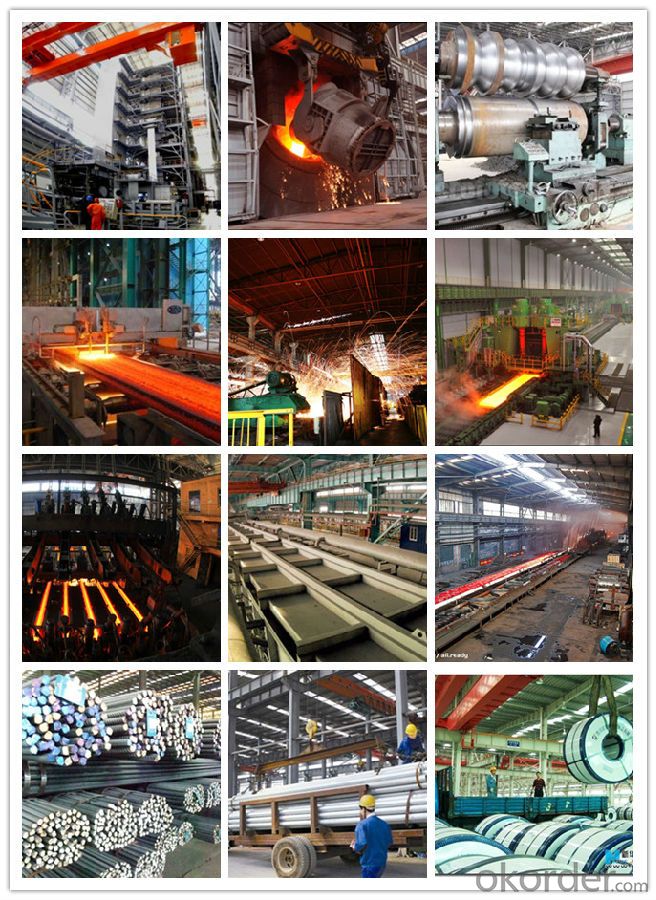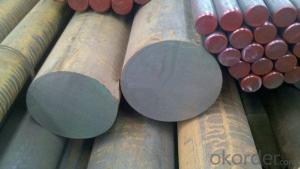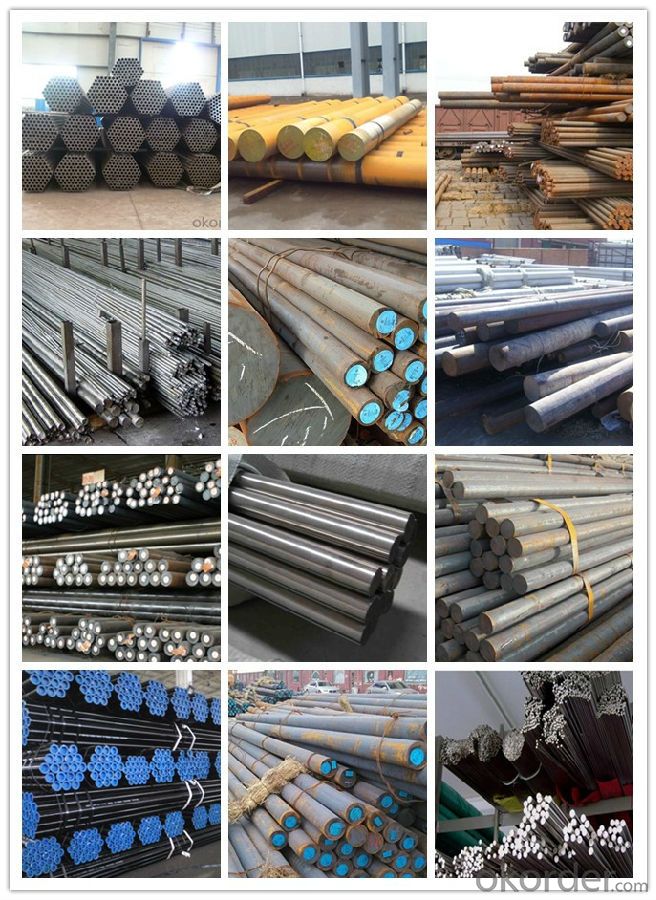Mold Material AISI D2 Hot Rolled Steel Round Bar
- Loading Port:
- China main port
- Payment Terms:
- TT OR LC
- Min Order Qty:
- 30 m.t.
- Supply Capability:
- 10000 m.t./month
OKorder Service Pledge
OKorder Financial Service
You Might Also Like
Item specifice
Mold material AISI D2 hot rolled steel round bar
Description:
Ledeburitic chromium cold work tool steel; with very small hardening deformations, very wear resistant, less resistant to impacts than NC11 / 1.2080, with good ductility, good cutting properties, much harder than NC10 and NC11/1.2080 due to content of molybdenum and vanadium .
Chemical composition:
Country | Steel NO. | C | Si | Mn | Cr | Mo | V | P | S | Other |
USA AISI | D2 | 1.40-1.60 | 0.30-0.50 | 0.30-0.50 | 11.0-13.0 | 0.70-1.20 | (0.80) | ≤0.025 | ≤0.025 | Co:0.60 |
Delivery condition:
Hot rolled or forging
EAF or ESR material
Black or machined surface
Available sizes:
Round bar size: 20-500mm
Thickness: 20-300mm
Width: 205-610mm
Length: 2000-5800mm
Heat Treatment:
1) Quenching temperature: 1000--1040°C
Cooling Medium: oil-cooling or air-cooling
Tempering temperature: 180-200°C, by two times
Tempering Hardness: ≥63.0HRC
2) Quenching temperature: 1060--1080°C
Cooling Medium: oil-cooling or air-cooling
Tempering temperature: 500-540°C, by two times
Tempering Hardness: ≥59.0-61.0HRC
Application:
High performance cutting tools, broaches, milling cutters, reamers, blanking dies, dies, punches, rolling rolls, tools for cutting paper, marble and plastics, cold stamping and extruding tools .
Product show
Workshop show

Shipping
1. FedEx/DHL/UPS/TNT for samples, Door-to-Door;
2. By Air or by Sea for batch goods, for FCL; Airport/ Port receiving;
3. Customers specifying freight forwarders or negotiable shipping methods!
Delivery Time: 3-7 days for samples; 5-25 days for batch goods.
Payment Terms
1.Payment: T/T, L/C, Western Union, MoneyGram,PayPal; 30% deposits; 70% balance before delivery.
2.MOQ: 1pcs
3.Warranty : 3 years
4.Package Informations: 1) EXPORT, In 20 feet (GW 25 ton) or 40 feet Container (GW 25 ton)
2)as customer's requirement
Why choose us?
(1) The leading exporter in China special steel industry.
(2) Large stocks for various sizes, fast delivery date.
(3) Good business relationship with China famous factories.
(4) More than 7 years steel exporting experience.
(5) Good after-sales service guarantee.
- Q:How does special steel contribute to the medical industry?
- Special steel contributes to the medical industry by providing essential materials for the manufacturing of medical devices and equipment. Its unique properties, such as high strength, corrosion resistance, and biocompatibility, make it suitable for various applications, including surgical instruments, implants, prosthetics, and MRI machines. The use of special steel ensures the durability, precision, and safety of medical tools, ultimately improving patient outcomes and advancing medical technologies.
- Q:What are the future prospects for the special steel industry?
- The future prospects for the special steel industry are promising. With the increasing demand for high-performance and durable materials in various sectors such as automotive, aerospace, construction, and energy, the special steel industry is expected to witness steady growth. Additionally, advancements in technology and innovation are likely to drive the development of new and improved special steel alloys, further boosting the industry's prospects. Furthermore, the growing emphasis on sustainability and environmental regulations may create opportunities for the special steel industry to develop eco-friendly solutions. Overall, the special steel industry is well-positioned for a prosperous future.
- Q:Can special steel be used in the computer manufacturing industry?
- Yes, special steel can be used in the computer manufacturing industry. It is often used for making computer casings, hard drive components, and other structural parts due to its high strength, durability, and resistance to corrosion.
- Q:What are the different impact-resistant grades of special steel?
- Impact-resistant grades of special steel refer to steel alloys that are specifically designed to withstand high impact and shock loads without fracturing or deforming. These grades of steel are commonly used in applications where resistance to impact and toughness are crucial, such as in construction, mining, automotive, and defense industries. There are several different impact-resistant grades of special steel available, each with its own unique characteristics and properties. Some of the commonly used impact-resistant grades include: 1. AR400: This grade of steel has a nominal hardness of 400 Brinell (HB) and is known for its exceptional resistance to abrasion and impact. It is often used in applications where high wear resistance is required, such as in bucket liners, crushers, and hoppers. 2. AR500: With a nominal hardness of 500 HB, AR500 steel offers even higher resistance to wear and impact compared to AR400. It is commonly used in applications involving heavy machinery, mining equipment, and armored vehicles. 3. AR600: This grade of steel has a nominal hardness of 600 HB, making it one of the toughest and most impact-resistant steels available. It is often used in applications where extreme wear resistance and durability are essential, such as in chutes, conveyors, and ballistic protection. 4. T-1: T-1 steel is a high-strength, low-alloy (HSLA) steel that offers excellent impact resistance and toughness. It is typically used in applications where high strength and toughness are required, such as in structural components, heavy equipment, and offshore drilling rigs. 5. QT or Quenched and Tempered Steels: These steels are specifically heat-treated to enhance their toughness and impact resistance. They are commonly used in applications that require a combination of high strength, toughness, and impact resistance, such as in gears, shafts, and armor plates. It is important to note that the specific impact resistance of a steel grade depends not only on its composition but also on factors such as heat treatment, fabrication techniques, and design considerations. Therefore, it is crucial to consult with steel manufacturers or experts to determine the most suitable impact-resistant grade for a particular application.
- Q:What are the different methods for controlling the grain size in special steel?
- There are several methods for controlling the grain size in special steel. One common method is through the use of alloying elements such as vanadium or niobium, which can help refine the grain structure. Another approach is to employ controlled cooling techniques, such as quenching or tempering, to manipulate the rate at which the steel solidifies and thus control the grain size. Additionally, grain size can be influenced by the addition of grain refiners or by subjecting the steel to severe plastic deformation processes like rolling or forging. Overall, these methods allow for precise control over the grain size in special steel, enabling improved mechanical properties and performance.
- Q:Can special steel be used in the production of gears?
- Yes, special steel can be used in the production of gears. Special steel, such as alloy steel or tool steel, is often preferred in gear manufacturing due to its high strength, wear resistance, and ability to withstand heavy loads and high temperatures. This steel type ensures gears have the necessary durability and performance required for various applications.
- Q:What are the applications of special steel in the power generation supply chain?
- Special steel plays a crucial role in the power generation supply chain, specifically in applications where high strength, corrosion resistance, and temperature resistance are required. It is extensively used in the construction of power plant components such as boilers, turbines, and generators, as well as transmission lines and distribution systems. Special steel ensures the reliability and efficiency of power generation equipment, enabling it to withstand harsh operating conditions and maintain long-term performance.
- Q:How is boron steel used in automotive safety applications?
- Boron steel is used in automotive safety applications due to its exceptional strength and ability to absorb impact energy. It is commonly utilized in the construction of car bodies and safety components such as side impact beams, roll cage reinforcements, and door intrusion beams. By incorporating boron steel, vehicles can better withstand and distribute crash forces, providing enhanced protection to occupants during collisions.
- Q:How does special steel perform in terms of magnetic permeability?
- Special steel has a relatively low magnetic permeability, making it less prone to magnetization and allowing it to resist the effects of external magnetic fields.
- Q:How does special steel perform in terms of creep resistance?
- Special steel performs exceptionally well in terms of creep resistance. It is specifically designed to withstand high temperatures and long-term exposure to stress, making it highly resistant to deformation or failure under such conditions. Its unique composition and heat treatment processes enhance its ability to maintain structural integrity, making it a preferred choice for applications where creep resistance is crucial, such as in power plants, aerospace components, and high-temperature industrial environments.
1. Manufacturer Overview |
|
|---|---|
| Location | |
| Year Established | |
| Annual Output Value | |
| Main Markets | |
| Company Certifications | |
2. Manufacturer Certificates |
|
|---|---|
| a) Certification Name | |
| Range | |
| Reference | |
| Validity Period | |
3. Manufacturer Capability |
|
|---|---|
| a)Trade Capacity | |
| Nearest Port | |
| Export Percentage | |
| No.of Employees in Trade Department | |
| Language Spoken: | |
| b)Factory Information | |
| Factory Size: | |
| No. of Production Lines | |
| Contract Manufacturing | |
| Product Price Range | |
Send your message to us
Mold Material AISI D2 Hot Rolled Steel Round Bar
- Loading Port:
- China main port
- Payment Terms:
- TT OR LC
- Min Order Qty:
- 30 m.t.
- Supply Capability:
- 10000 m.t./month
OKorder Service Pledge
OKorder Financial Service
Similar products
New products
Hot products
Related keywords































